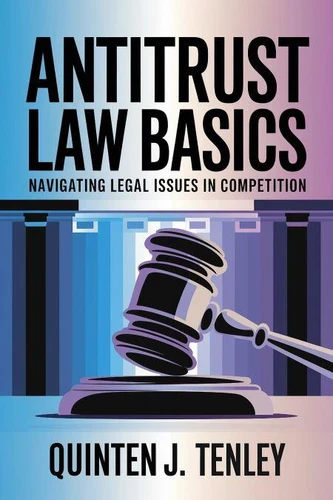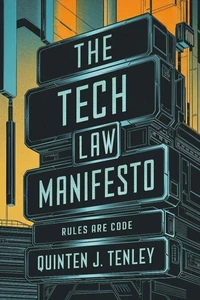Antitrust Law Basics: Navigating Legal Issues in Competition
Par :Formats :
Disponible dans votre compte client Decitre ou Furet du Nord dès validation de votre commande. Le format ePub est :
- Compatible avec une lecture sur My Vivlio (smartphone, tablette, ordinateur)
- Compatible avec une lecture sur liseuses Vivlio
- Pour les liseuses autres que Vivlio, vous devez utiliser le logiciel Adobe Digital Edition. Non compatible avec la lecture sur les liseuses Kindle, Remarkable et Sony
 , qui est-ce ?
, qui est-ce ?Notre partenaire de plateforme de lecture numérique où vous retrouverez l'ensemble de vos ebooks gratuitement
Pour en savoir plus sur nos ebooks, consultez notre aide en ligne ici
- FormatePub
- ISBN8227229298
- EAN9798227229298
- Date de parution10/11/2024
- Protection num.pas de protection
- Infos supplémentairesepub
- ÉditeurBig Dog Books, LLC
Résumé
Antitrust Law Basics: Navigating Legal Issues in Competition is a clear, insightful guide to understanding the core principles of antitrust law, making it accessible for legal professionals, business leaders, and anyone curious about the forces that shape fair competition. Antitrust laws play an essential role in our economy, keeping markets competitive, preventing monopolies, and protecting consumer rights.
This book breaks down complex laws, examining essential statutes like the Sherman Act, Clayton Act, and FTC Act while discussing landmark cases and real-world applications. In this comprehensive guide, readers will gain a practical understanding of the laws regulating monopolies, mergers, and unfair competition. Learn how these laws impact everything from small business growth to corporate mergers, and explore how they intersect with today's technological challenges, such as digital monopolies and data privacy concerns.
With practical explanations and easy-to-follow language, this book is a valuable resource whether you are a legal practitioner, policymaker, or simply interested in how market fairness is maintained in a complex economy. Antitrust Law Basics also explores current debates, examining the role of antitrust in the technology sector, the growing influence of global competition regulation, and emerging ideas that may reshape the future of competition law.
Discover how antitrust regulation adapts to new economic challenges and global markets and why understanding these laws is crucial for anyone involved in business today. What You Will Find in This Book: An overview of the history and evolution of U. S. antitrust law Detailed analysis of the Sherman Act, Clayton Act, and FTC Act Insight into monopolistic practices and their impact on competition Explanation of key antitrust cases that shaped modern regulations Analysis of mergers, acquisitions, and the role of the Clayton Act Guidance on navigating digital markets and tech monopolies Exploration of consumer welfare and public interest perspectives Overview of global antitrust practices and international cooperation Practical insights for legal professionals and business leaders alike Antitrust Law Basics provides the essential knowledge and tools to understand and navigate the complex legal landscape of competition, making it a must-read for anyone interested in the laws that define fair and open markets.
This book breaks down complex laws, examining essential statutes like the Sherman Act, Clayton Act, and FTC Act while discussing landmark cases and real-world applications. In this comprehensive guide, readers will gain a practical understanding of the laws regulating monopolies, mergers, and unfair competition. Learn how these laws impact everything from small business growth to corporate mergers, and explore how they intersect with today's technological challenges, such as digital monopolies and data privacy concerns.
With practical explanations and easy-to-follow language, this book is a valuable resource whether you are a legal practitioner, policymaker, or simply interested in how market fairness is maintained in a complex economy. Antitrust Law Basics also explores current debates, examining the role of antitrust in the technology sector, the growing influence of global competition regulation, and emerging ideas that may reshape the future of competition law.
Discover how antitrust regulation adapts to new economic challenges and global markets and why understanding these laws is crucial for anyone involved in business today. What You Will Find in This Book: An overview of the history and evolution of U. S. antitrust law Detailed analysis of the Sherman Act, Clayton Act, and FTC Act Insight into monopolistic practices and their impact on competition Explanation of key antitrust cases that shaped modern regulations Analysis of mergers, acquisitions, and the role of the Clayton Act Guidance on navigating digital markets and tech monopolies Exploration of consumer welfare and public interest perspectives Overview of global antitrust practices and international cooperation Practical insights for legal professionals and business leaders alike Antitrust Law Basics provides the essential knowledge and tools to understand and navigate the complex legal landscape of competition, making it a must-read for anyone interested in the laws that define fair and open markets.
Antitrust Law Basics: Navigating Legal Issues in Competition is a clear, insightful guide to understanding the core principles of antitrust law, making it accessible for legal professionals, business leaders, and anyone curious about the forces that shape fair competition. Antitrust laws play an essential role in our economy, keeping markets competitive, preventing monopolies, and protecting consumer rights.
This book breaks down complex laws, examining essential statutes like the Sherman Act, Clayton Act, and FTC Act while discussing landmark cases and real-world applications. In this comprehensive guide, readers will gain a practical understanding of the laws regulating monopolies, mergers, and unfair competition. Learn how these laws impact everything from small business growth to corporate mergers, and explore how they intersect with today's technological challenges, such as digital monopolies and data privacy concerns.
With practical explanations and easy-to-follow language, this book is a valuable resource whether you are a legal practitioner, policymaker, or simply interested in how market fairness is maintained in a complex economy. Antitrust Law Basics also explores current debates, examining the role of antitrust in the technology sector, the growing influence of global competition regulation, and emerging ideas that may reshape the future of competition law.
Discover how antitrust regulation adapts to new economic challenges and global markets and why understanding these laws is crucial for anyone involved in business today. What You Will Find in This Book: An overview of the history and evolution of U. S. antitrust law Detailed analysis of the Sherman Act, Clayton Act, and FTC Act Insight into monopolistic practices and their impact on competition Explanation of key antitrust cases that shaped modern regulations Analysis of mergers, acquisitions, and the role of the Clayton Act Guidance on navigating digital markets and tech monopolies Exploration of consumer welfare and public interest perspectives Overview of global antitrust practices and international cooperation Practical insights for legal professionals and business leaders alike Antitrust Law Basics provides the essential knowledge and tools to understand and navigate the complex legal landscape of competition, making it a must-read for anyone interested in the laws that define fair and open markets.
This book breaks down complex laws, examining essential statutes like the Sherman Act, Clayton Act, and FTC Act while discussing landmark cases and real-world applications. In this comprehensive guide, readers will gain a practical understanding of the laws regulating monopolies, mergers, and unfair competition. Learn how these laws impact everything from small business growth to corporate mergers, and explore how they intersect with today's technological challenges, such as digital monopolies and data privacy concerns.
With practical explanations and easy-to-follow language, this book is a valuable resource whether you are a legal practitioner, policymaker, or simply interested in how market fairness is maintained in a complex economy. Antitrust Law Basics also explores current debates, examining the role of antitrust in the technology sector, the growing influence of global competition regulation, and emerging ideas that may reshape the future of competition law.
Discover how antitrust regulation adapts to new economic challenges and global markets and why understanding these laws is crucial for anyone involved in business today. What You Will Find in This Book: An overview of the history and evolution of U. S. antitrust law Detailed analysis of the Sherman Act, Clayton Act, and FTC Act Insight into monopolistic practices and their impact on competition Explanation of key antitrust cases that shaped modern regulations Analysis of mergers, acquisitions, and the role of the Clayton Act Guidance on navigating digital markets and tech monopolies Exploration of consumer welfare and public interest perspectives Overview of global antitrust practices and international cooperation Practical insights for legal professionals and business leaders alike Antitrust Law Basics provides the essential knowledge and tools to understand and navigate the complex legal landscape of competition, making it a must-read for anyone interested in the laws that define fair and open markets.
















